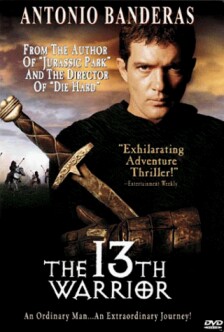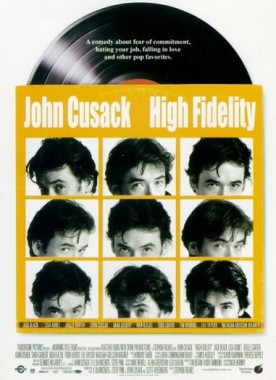Thirteenth Warrior, The
The 13th Warrior, directed by John McTiernan, is a Hollywoodification
of Michael Crichton’s attempt to re- imagine Beowulf in his novel,
Eaters of the Dead, with the help of a 10th century Arabic account of
adventures in Central Asia. It was Kipling who pioneered this sort of thing in
his brilliant story, “The Knife and the Naked Chalk,” in Rewards and
Fairies, a story which purported to give a naturalistic explanation of the
Norse myth of Odin. But there was a resonance to that tale about a man who
unwillingly became a god which is lacking here. Kipling was careful to preserve
the mystery of the myth as well as the humanity of the man, and he did not
impose upon it recognizably modern assumptions. Without such care there is
something suspiciously patronizing, as there is here, about saying, in effect:
“We know it couldn’t have been the way it is in the story, so this is what we,
with our superior knowledge, suppose must really have happened.”
Not that there are not some good things in the film. Its silent conversion of
the magnificent hall of Heorot in the poem into little more than a collection of
primitive huts has the persuasive stamp of reality on it, and it was clever to
have imagined the monstrousness of Grendel in moral rather than physical terms.
Instead, that is, of a single, quasi-human creature with superhuman strength, he
becomes a whole tribe (called Wendels or Vendels) of fierce cave-dwellers who
paint their bodies black and dress up in bear costumes. They are said to eat
those whom they kill in battle (and may in fact do so in ritual fashion) because
they dismember them and carry off body parts, especially arms and heads, as
sacrifices to their goddess, represented by an African-looking fertility
totem.
But the goddess also lives in human form, surrounded by piles of skulls, in
the deepest part of the Vendels’ underwater cave, and this creature, whom the
heroes must kill in order to defeat the enemy, is obviously meant to be
Grendel’s mother. Thus the heroism of the warriors, vaguely identified as
“Northmen” and their Arab companion, played by Antonio Banderas, who is the
eponymous 13th man, requires that they recognize first the inhumanity of the
enemy’s behavior (that’s why he is “not a man”) and then the underlying humanity
that makes him vulnerable. When Banderas pulls off the bear-disguise of one of
the slain foes he keeps repeating: “It’s a man; it’s a man.” Then, when they are
in the cave and in presence of the pile of human skulls and bones, the moral
lesson is repeated: “No, they are not men.”
The Arab is represented as the one with the brains, the one who figures out
how to find the queen while the big, dumb Norsemen’s only plan is: “Ride till we
find them; kill them all.” But at least two of the Norsemen are portrayed
sympathetically, the happy warrior Herger the Joyous (Dennis Storhoi) who
teaches the Arab the secret of his courage (“Your fate is fixed: fear profits a
man nothing”), and the biggest and strongest and most admired of them, Buliwyf
(Vladimir Kulich), whose job it is to kill the queen. The latter sees that the
Arab’s ability to write is a skill worth acquiring, and after he is wounded by
the queen/goddess’s poisoned bear-claw, he says to the others in what is nearly
his longest speech: “A man may be thought wealthy if someone were to draw his
deeds—that they might be remembered.” Thus in the final scene, we see
Banderas’s sheikh, returned at last to Araby, writing down the deeds of the
heroes in Arabic.
All this is almost but not quite enough to overcome the little annoyances of
the film. The discontent of Wiglaf (Anders T. Andersen) in the poem is brought
up only to be abandoned, for instance, while his name is changed to Wigliff. In
the same way Beowulf becomes Buliwyf, Wealtheow, Weilew. Wouldn’t a
contemporary bard or scop have been more likely than our modern re-imaginer at
least to get the names right? Worst of all, the story often seems in danger of
turning into a multicultural morality tale. “Good-bye, Arab,” cries Herger as
Banderas returns to his own land in the end. “Good-bye, Northman,” calls out the
dewy-eyed Arab. This kind of thing gives the film the unmistakable hallmark of
the late 20th century and calls into question all the rest of it.
Discover more from James Bowman
Subscribe to get the latest posts to your email.




